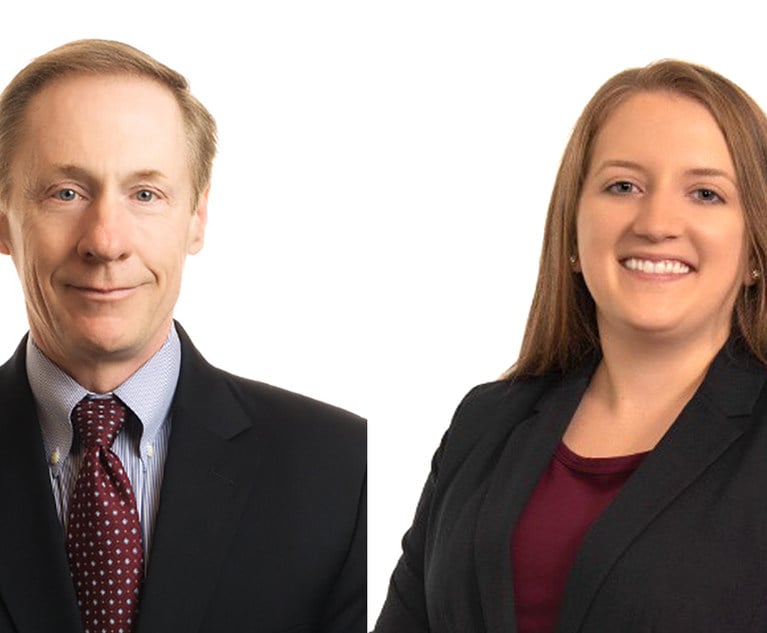Marcy J Mclaughlin

September 07, 2023 | The Legal Intelligencer
Second Circuit Finds Syndicated Loan Notes Are Not SecuritiesThe court affirmed the U.S. District Court for the Southern District of New York's decision that notes issued from the syndicated loan transaction were not securities under the application of the test set forth in the U.S. Supreme Court's decision in Reves v. Ernst & Young.
By Francis J. Lawall and Marcy J. McLaughlin Smith
8 minute read

May 04, 2023 | The Legal Intelligencer
Consulting Experts—When Privilege May Not ApplyA recent decision by the Bankruptcy Court for the Northern District of Texas, Northwest Senior Housing v. Intercity Investment Properties (In re Northwest Senior Housing), addressed these important issues involving the retention of a public relations firm and highlights some important pitfalls to avoid.
By Francis J. Lawall and Marcy J. McLaughlin Smith
6 minute read

December 15, 2022 | The Legal Intelligencer
Second Circuit Orders Refund of Unconstitutional Quarterly Fee OverpaymentMany practitioners have been speculating as to how courts will address the potential remedy for the unconstitutional U.S. trustee fees imposed against Chapter 11 debtors pending in U.S. trustee districts under the 2017 amendment to 28 U.S.C. Section 1930 (the 2017 amendment).
By Francis J. Lawall and Marcy J. McLaughlin Smith
7 minute read

June 09, 2022 | The Legal Intelligencer
Mandatory Cost-Shifting for Compliance With Nonparty Subpoenas?A recent letter ruling by the Delaware Bankruptcy Court in Mesabi Metallics v. Cleveland-Cliffs, may provide some relief to a nonparty, and change a party's cost-benefit analysis when deciding whether to issue a third party subpoena.
By Francis J. Lawall and Marcy J. McLaughlin Smith
6 minute read

October 28, 2021 | The Legal Intelligencer
Not All Distributions Are 'Disbursements' Subject to US Trustee FeesNowhere else is the old saying "you can't escape death and taxes" better exemplified than in Chapter 11. Under the Bankruptcy Code, debtors are subject to stringent reporting and fee requirements imposed by the Department of Justice and the Office of the U.S. Trustee.
By Francis J. Lawall and Marcy J. McLaughlin Smith
6 minute read

September 10, 2021 | The Legal Intelligencer
Third Circuit—Bar Date Controls Post-Confirmation, Pre-Effective Date ClaimsA recent case of first impression from the U.S. Court of Appeals for the Third Circuit provides guidance on this important decision for those claims that arise during the period between plan confirmation and the plan's effective date.
By Francis J. Lawall and Marcy J. McLaughlin Smith
7 minute read

March 11, 2021 | The Legal Intelligencer
Applying the Common Interest Doctrine in Plan-Related DiscoveryThe common interest doctrine creates an oftentimes frustrating exception to the general rule that disclosure of information to a party outside of the normal attorney-client relationship destroys privilege.
By Francis J. Lawall and Marcy J. McLaughlin Smith
7 minute read

July 30, 2020 | The Legal Intelligencer
10th Circuit Narrows Scope of Subsequent Transferee RecoveryUnder the Bankruptcy Code, not only can the initial recipient of a fraudulent conveyance be held liable, but so too can a subsequent transferee. However, there can be important nuances in the challenged transaction that may provide a subsequent transferee with a substantial defense. One of those nuances was recently identified by the U.S. Court of Appeals for the Tenth Circuit
By Francis J. Lawall and Marcy J. McLaughlin Smith
7 minute read

February 06, 2020 | The Legal Intelligencer
Stay Relief Orders Denied With Prejudice Immediately AppealableA critical bankruptcy litigation issue has finally been resolved by the U.S. Supreme Court. Until recently, litigants had been faced with the dilemma of whether to immediately appeal a denial with prejudice of a request for stay relief or wait until the underlying matter had been fully adjudicated.
By Francis J. Lawall and Marcy J. McLaughlin Smith
6 minute read

August 01, 2019 | The Legal Intelligencer
Amended US Trustee Fee Schedule Ruled UnconstitutionalThe Office of U.S. Trustee, a division within the Department of Justice, is known among practitioners as the “watchdog” of the bankruptcy process. To fund the U.S. Trustee, Chapter 11 debtors must pay quarterly fees, with the amount due calculated based upon the debtor's disbursements during the preceding quarter.
By Francis J. Lawall and Marcy J. McLaughlin
7 minute read
Trending Stories
- 1Who Are the Judges Assigned to Challenges to Trump’s Birthright Citizenship Order?
- 2Litigators of the Week: A Directed Verdict Win for Cisco in a West Texas Patent Case
- 3Litigator of the Week Runners-Up and Shout-Outs
- 4Womble Bond Becomes First Firm in UK to Roll Out AI Tool Firmwide
- 5Will a Market Dominated by Small- to Mid-Cap Deals Give Rise to a Dark Horse US Firm in China?



